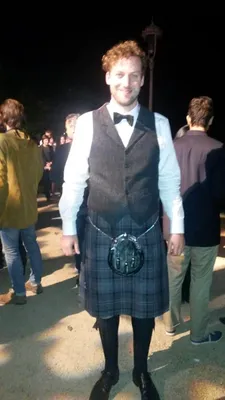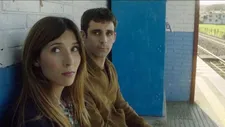Pikadero, the Basque language debut feature from Edinburgh-based filmmaker Ben Sharrock, had its world premiere in the New Directors section of San Sebastian Film Festival this year and has gone on to win the FIPRESCI prize and Best Film award at the Ukraine's Molodist Film Festival in Kyiv. It stars Joseba Usabiaga and Bárbara Goenaga as Ane and Gorka - a pair of twentysomethings who are trapped by the economic crisis. The title refers not only to riding schools but is also slang for a public place used for sexual trysts - the only option for Ane and Gorka since they both still live at home. Sharrock's gently absurd film follows the pair as they try - and fail - to get some time alone at the same time as they begin to question their hopes for the future. I caught up with Sharrock to chat about the film, shortly after its San Sebastian premiere.
How does an Edinburgh filmmaker come to be making their first film in Basque? 
So, the producer of the film Irune Gurtubai is also my partner and she's Basque. So I ended up spending a lot of time in the Basque Country, I've been back and forth between Edinburgh and there for the past two to three years. It was during my time here that I got the inspiration for the story from what was around me - the effects of the economic crisis and the environment that was around me. It just kind of happened. I wrote the story and it was something that was natural and organic, then the film sort of snowballed and we went for it.
So have you ever had a pikadero in the Basque country?
I actually haven't. But one of the funniest things is that when we were location scouting, we went up to this spot for the scene of a pikadero... and there was a car parked there with steamed up windows. But I've not actually been to a pikadero myself.
The way you have shot the film is interesting, with lots of locked-off shots where the camera doesn't move very much. What made you want to shoot it like that?
It's a mix of things. Stylistically, that's my preference, my taste. When I think about how to shoot a scene, that's how I see things in my head, so I have to shoot it like that. But I think the writing process goes hand in hand with the style of the film. So the film is about stasis. It's about stasis in the protagonists' life and it's also about stasis in the economy and I wanted that static camera to reflect that stasis. I think that's really important.
It certainly helps you when you want the scene to be claustrophobic. All of a sudden you go from having nobody in the scene or someone off to one side, to having five heads crammed in the frame.
Absolutely. I wanted the interiors in his house to be very claustrophobic so that everyone is crammed into the frame and I wanted to create that feeling of claustrophobia from the perspective of him living at home and wanting to break out of that.
Do you meet your partner Irune because she moved to Scotland?
Yes, we both studio at Screen Academy Scotland, so we met there while we were doing our Masters.
This move of young people from Spain to Edinburgh is very popular. It's recently been the subject of a documentary, En Tierra Extraña by Iciar Bollain.
 |
| Ben Sharrock on Pikadero: "The film is about stasis. It's about stasis in the protagonists' life and it's also about stasis in the economy and I wanted that static camera to reflect that stasis." |
Did you have any worries about shooting it in Basque?
To be honest, I wasn't but it is a bit crazy of me not to be concerned about it. I can understand quite a bit of Basque even though I'm not great at speaking. What I did, was I learnt my script in Basque, so I knew the entire thing, so I could follow the performances almost as if I was listening to it in English. I also worked closely with Irune, the producer, and she was always there to help me.
How was working with someone that you're also personally involved with - was that difficult?
At time, yes. But overall it was fine. We work pretty well together. At times, it was high pressure and difficult but what's great about her is I really trust her judgement - and that's what you need from a producer, especially a creative producer.
The film feels very culturally authentic?
That's the feedback I've been getting here in San Sebastian, that it is authentic and accurate.
I'm thinking particularly of the men who seranade them about one point.
That's a cultural thing here - the Txikiteros sing in the bars. I am very interested in different cultures and always have been. My undergraduate degree was in Arabic and politics. I've just always been really interested in other cultures, so during my time here it was very natural to observe the people and try to absorb all these cultural things.
You do try to fit in quite a lot of cultural reference - there's mention of the Scottish kilt and talk about German having all types of wurst except for chorizo. Presumably, you're hoping the film will tap into things in all sorts of countries.
The film is about Basque people, it's set in the Basque Country and is a Basque language film but I wanted it to be a universally relatable film as well. I want it to be a film that can travel, so I wanted to bring in those different aspects of different countries and people's ideas of other countries from here. You've got people travelling to Germany but not knowing what's in Germany at that point.
The colour you use in the film is very interesting. There is a lot of blue and yellow. Was it hard to find locations to fit with your themes?
The palette was very important to me and I really wanted to look after that. It's an aesthetic thing that I really like. I think it adds to the aesthetic of the film.
It reminded me of the way Aki Kaurismäki uses colour?
 |
| Joseba Usabiaga and Bárbara Goenaga as Ane and Gorka in Pikadero |
How did you cast it?
When I first wrote the script, I didn't know a lot of Basque actors, so Irune is really to thank for that. I asked her to read the script and suggest people who might play the characters and she immediately said Bárbara Goenaga and Joseba Usabiaga for Ane and Gorka and she showed me and I said, 'Yes, that's exactly what I had in mind' We contacted them and they liked the film and came on board. So a lot of that casting came from Irune's vision. That's why we work so well together, she sees what I see and understands what I want and that's really important.
San Sebastian is the first place that you've brought the film and it's in the New Director's section not just the Basque film strand, which must be pretty exciting?
Yes, this is exactly what we wanted when we first started on the project and we've achieved that. We had the world premiere yesterday and it went really well. There was a really positive response. The Basques seem to be pleased with it an accepting it.
So, will you bring it back to Scotland?
We would love to have our UK premiere in Edinburgh next June.





















